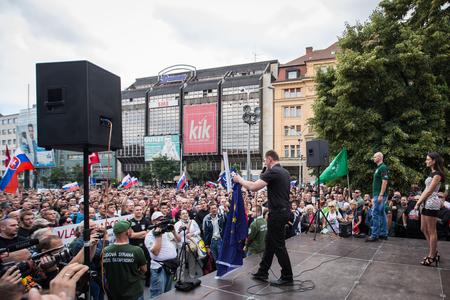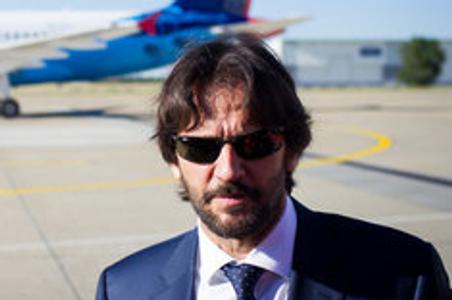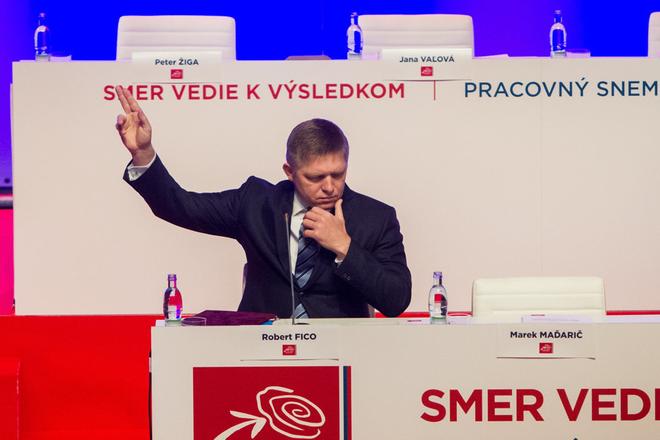The current government has no scandals, Jaguar is the biggest foreign investment in Europe, and Slovakia's EU Council presidency cost half of what the neighbouring Czech Republic spent. These non-truths were repeatedly spread by government representatives during debates in 2016, mostly without being confronted by reality. Leaders of coalition parties also tend to make false statements when boasting about their own successes.
In 2016, Prime Minister and Smer head Robert Fico did not tell the truth in 17.7 percent of all his factual statements and was misleading 9.7 percent of the time. The head of the Most-Híd party used false arguments in 26.5 percent of his statements and 4.4 percent of his statements in 2016 were misleading.
Head of the SNS party and Parliamentary Speaker Andrej Danko had a problem particularly with numbers. Despite boasting during one debate of using only correct facts, 28.8 percent of his statements in 2016 were untrue and more than 10 percent were misleading.
This data stems from an analysis carried out by the project, Demagog (demagogue) which fact checks the major statements of politicians and public figures in select interviews and debates.
In general, around 68 percent of all politicians' statements were true, which means the number of false statements modestly increased last year. Another problem is that politicians continue repeating the same lies without being confronted about it by someone from the public space, according to Anna Peniašková, senior analyst of Demagog.
“Using false facts is a general trend in political communication which began with rise of network social media such as Twitter and Facebook,” recognised Czech TV and radio host Václav Moravec told The Slovak Spectator. “Donald Trump has mastered it as he doesn’t need to organise press conferences, give interviews or take part in debates.”

Fico’s growth
In 2016 Fico repeatedly stated that he acted immediately after some of his ministers failed and that his current government constructed after the March 2016 elections has no serious cases. He claimed that despite his government having faced the Bašternák case connected with Interior Minister Robert Kaliňák, suspicions of overpriced activities during Slovakia's EU Council presidency, and alleged abuse of children in the Čistý deň resocialisation centre.
“It’s possible that the Prime Minister defines the word “case” in a different way,” Demagóg team says in its report, “but it still doesn’t change the fact, that many unclear and unexplained cases of failures related to this government have occurred.”
Many of Fico’s wrong statements were related to Slovakia’s economy. Slovakia is the most industrial country and the country with the highest economic growth in European Union, according to him. Moreover, Slovakia attracted the biggest foreign investment in Europe in recent years, Fico claims.
None of those statements is true, Demagóg team points out.
Slovakia has the fifth highest economic growth forecast according to an autumn 2016 economic forecast of European Commission after Malta, Romania, Ireland and Luxembourg. When it comes to industry, the latest World Bank data shows that industry accounts for 33.6 percent of Slovak GDP; the second highest number after the Czech Republic, which reached 38 percent.
Jaguar Land Rover will invest €1.4 billion in Slovakia to build a new plant and the state will support the project with €130 million. However, there have been bigger investments recently announced in Europe. For example, Great Britain made a deal with Chinese Company, CGN in 2015 which will invest €6 billion in the construction of a nuclear power plant.
“This is easily accessible information but no one brings it up, so they [politicians] can comfortably use such information,” Peniašková told The Slovak Spectator.
Danko and numbers
Many of Danko's factual mistakes came in a political discussion in November when discussing state representatives' salaries. Danko stated that the president's salary is between 11 and 12 thousand euros, while he estimated his salary as parliamentary speaker to be about €2,600.
In fact, the gross salary for the president is €7,844, while the Parliamentary speaker has a gross salary of around €2,400.
Unlike Fico, Parliamentary Speaker Danko has several times used false facts which have weakened his arguments. For example, in October 2016 he complained about his predecessor, Richard Sulík (SaS) having paid €14,000 for a bookcase in the National Council. In fact, the bookcase cost about €8,000 more.
“I have facts,” Danko said during the same debate. “You can’t catch me in lying.”
In September 2016, Danko significantly overestimated health care levies from dividends introduced by the government of Iveta Radičová (2010-2012). He stated that the levies were 14 percent, but in fact they reached 10 percent.
Unknown shell companies
Béla Bugár, head of the coalition Most-Hid party, used false arguments mainly at the beginning of 2016 during the pre-election campaign and when forming the new government. Radičová’s government created 15,000 jobs, he stated at the time, while the real number was around 12,500.
He also claimed that Slovakia spends 17 percent of public finances on health care which is the highest number among OECD countries. However, Slovakia spent only 14 percent of public finances, according to the most recent OECD studies available at the time. Moreover, Slovakia did not top the list of countries but was somewhere in the middle.
Shell companies also became an issue in 2014, therefore, political parties started to prepare legislation dealing with such companies only recently, according to Bugár. However, Slovak media outlets have been publishing stories about shell companies since 2010. Even Fico was talking about them back then in order to point out shell companies in London close to the Slovak Democratic and Christian Union (SDKÚ).
“Bugár was a negative surprise for us this year,” Peniašková said, “He used to have better results.”

No corruption in top positions
While most top representatives of the ruling coalition make false statements when boasting about their own success, in the case of Interior Minister Robert Kaliňák it is different. He uses non-truths most often to defend cases of his Smer party, shows an analysis of the results of the Demagog.sk project.
“It is known about him and it also ensues from our analyses that he says the truth maybe in half of the cases and he tops the charts of unverifiable statements,” said Peniašková.
For example, when defending his Smer party against suspicions of overpriced activities during Slovakia's EU Council presidency, he claimed that it cost €70 million, half of what it cost neighbouring Czech Republic. The official Czech EU Council presidency website states that it cost around €73 million.
In early 2017, Kaliňák made headlines when he stated that Slovakia will not see an investigation of corruption among the highest political circles in 2017, as this socially undesirable phenomenon does not exist among political leaders.
“Give me one example from last year of corruption taking place on top political floors,” Kaliňák said at a press conference on January 4. “Tell me, please, at least one. You don't know? It didn’t happen. Neither you nor I have such information.”
The interior minister and the ruling Smer party vice-chairman in this context does not agree with Slovak President Andrej Kiska who, in his New Year’s speech, said that many Slovaks consider the unwillingness of the state to fight corruption properly to be a serious problem.
“I think that the president doesn’t have completely accurate information,” Kaliňák commented. “Neither him, nor me, nor any other politicians are investigators. It’s a huge error to simply project news stories into reality, because they’re false, as has been confirmed in the case of certain scandals.”
Corruption is not extraordinary, quite the opposite. It is the basic way things work in Slovakia. The fact that journalists do not have a court’s decision concerning corruption does not mean that they should not write about suspicions of corruption, according to one of the most recognised journalists in Slovakia, Marián Leško.
“In a situation when state supervision bodies, police and prosecutor offices are under political control, journalists have to inform the public about what is happening,” Leško told The Slovak Spectator, “despite the fact that they don’t have such possibilities as investigative bodies have, but don’t use them.”



 Prime Minister Robert Fico (source: Sme)
Prime Minister Robert Fico (source: Sme)